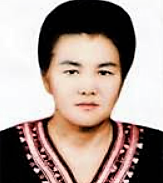

NEW YORK — In a grim indictment of Turkmenistan’s notoriously dire human rights record, the United Nations Human Rights Committee has found the government there responsible for the torture and death in custody after an unfair trial of Ogulsapar Muradova, a journalist and human rights activist who died in prison in September 2006.
Muradova had been a member and cofounder of the Turkmenistan Helsinki Foundation, an independent human rights group based in Bulgaria, and was also a reporter for the Turkmen service of Radio Free Europe/Radio Liberty. She was arrested over her human rights work in June 2006, together with her brother Sapardurdy Khadzhiev and another activist, Annakurban Amanklychev.
Muradova was subsequently sentenced to six years in prison after a bogus trial that lasted just two hours. The following month, her family learned from a neighbor that she had died in prison.
Injuries to Muradova’s body indicated that she died a violent death, including a deep cut in her forehead, a dark mark around her neck suggesting strangulation, three wounds on one of her hands, swelling and bruising to one of her ankles, and a large bruise on her thigh.
But the Turkmen government never investigated the circumstances of Muradova’s death, and claimed that she died of natural causes. More recently, the government claimed that it had investigated her death—without providing any information about that investigation—and that she had committed suicide.
In its decision in Khadzhiyev and Muradova v. Turkmenistan adopted on April 6, 2018, the Human Rights Committee issued a sweeping condemnation of Turkmenistan’s conduct, including:
- that the government of Turkmenistan arbitrarily detained Muradova due to her journalistic and human rights activities;
- that no effective investigation was conducted into allegations of torture and her death in custody; and
- that the government’s failure to provide any information about her death caused anguish and mental stress of her brother Annadurdy Khadzhiyev, who brought the complaint to the Committee that amounted to inhuman treatment.
In its decision, the committee called on the government of Turkmenistan to make full reparations to Muradova’s family, including by conducting a prompt and impartial investigation into what happened to her, by an independent commission of inquiry if required. The decision also called for adequate compensation and measures of satisfaction, including steps by the government to rehabilitate Muradova’s name.
Turkmenistan was also ordered to provide the family with a full account of its investigations, including the autopsy, copies of trial transcripts, and the court verdict. The government should also take all steps to prevent similar violations.
The complaint to the UN Human Rights Committee was filed by lawyers of the Open Society Justice Initiative on behalf of Annadurdy Khadzhiyev, who welcomed the ruling as a “sad victory for my late sister.”
He added: “At the same time, this decision reminds us about the others who have died in Turkmen prisons after torture, and of those still imprisoned on fabricated charges. Unfortunately, the case of my sister is not an exception but an illustration of Turkmen realities.”
Masha Lisitsyna, a senior legal officer with the Open Society Justice Initiative said: “The Human Rights Committee ruling is the first step to deliver justice to the family of Ogulsapar Muradova.
It is critically important for Turkmenistan to promptly take measures for the rehabilitation of her name and provide the family with the documents that might shed light on the circumstances of her trial and her death. Taking into account the grave nature of violations and total impunity, international partners should call on Turkmenistan to establish a commission of inquiry into this and similar cases.”
Human Rights Watch has described Turkmenistan as “one of the world’s most closed and oppressively governed countries.”
In 2015, the UN Human Rights Committee ruled that Muradova’s brother Sapardurdy Khadzhiev had been subjected to torture and ill treatment, including to obtain a forced confession; that he had been unlawfully detained; and that he had been denied his right to see his family while in prison. The Turkmenistan government has so far not taken any steps to implement the decision.
In 2013, a group of human rights organizations launched an international campaign to protect those in Turkmen prisons called Prove They Are Alive! that currently counts 113 confirmed cases of forced disappearances in Turkmenistan.
Many of these individuals have experiences similar to Muradova’s fate: they were perceived as a threat to the regime, there has been no verifiable information about their whereabouts since their arrest or trial, none of them had any contact with their family, and none of them have been seen by legal representation.
UN bodies and international human rights organizations have repeatedly condemned Turkmenistan for its serious human rights violations, in particular for torture and ill treatment against political opponents, journalists, and activists.
During its review of Turkmenistan’s human rights record in 2017, the Human Rights Committee also expressed its concern over a number of other issues, including constraints on religious freedoms, the use of forced labor, and the lack of an independent judiciary.
Learn More
Rights & Justice, Eurasia, Open Society Justice Initiative, Criminal Justice

